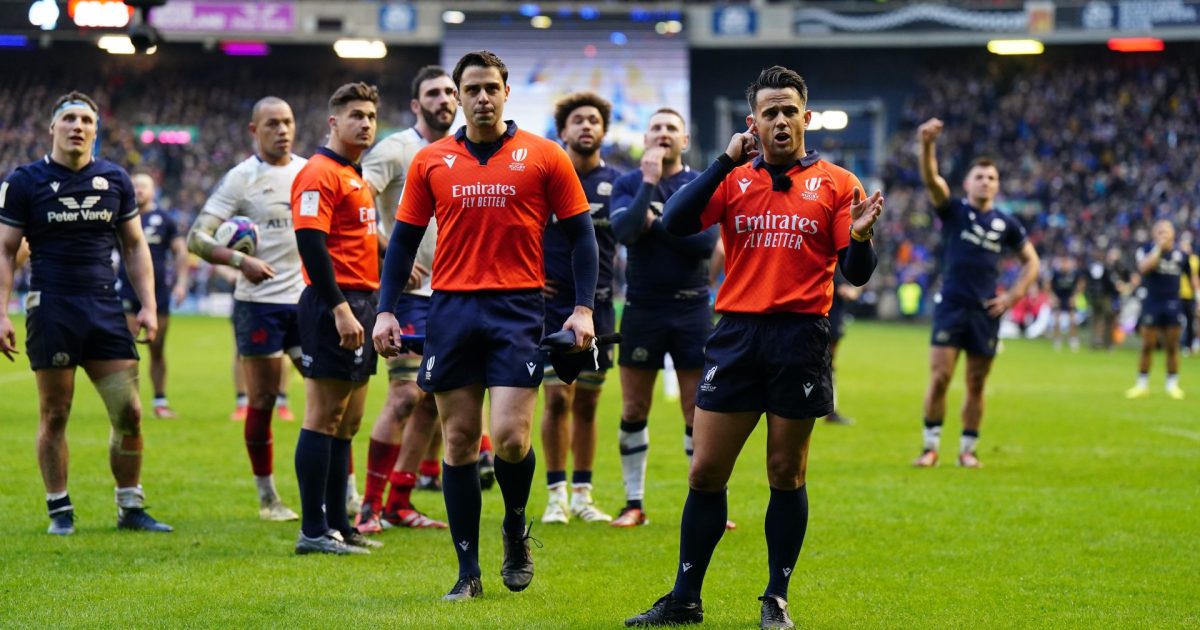The television match official has been part of rugby for over two decades now, but there have been few, if any, calls in its history as debatable and crucial as the one at Murrayfield on Saturday.
With Scotland trailing France 20-16 in Edinburgh, they produced a pick-and-go barrage on the French line in the final play of the game. Lock Sam Skinner burrowed his way towards the line, ending up near the whitewash with a melee of legs and boots around him.
Referee Nic Berry deemed the lock to be held up, but sent the decision to his TMO Brett Cronan, who, after minutes of deliberation, decided to stick with Berry’s call, meaning France held on to the win and pandemonium ensued online.
While this is a decision that will be debated perhaps for the rest of the Guinness Six Nations, or maybe even beyond, former referee Nigel Owens cleared a few things up this week on his show Whistle Watch.
The refereeing centurion specified that Cronan’s job was to find enough evidence to overturn Berry’s initial decision of no-try, not whether he thought it was a try or not. That is the fundamental part of the entire exchange between the referee and his TMO, and may provide some clarity to aggrieved Scotland fans.
“Was it a try, yes or no?” Owens said.
“What’s important to remember here is we have an on-field decision by the referee. So, if the referee has a gut feeling or believes he’s seen what has happened, he’ll give his view.
“So in this instance, he knows the ball is over the line and he knows that it’s held up. And therefore the question is ‘my on-field decision is no-try because I believe it to be held up.’
“If he wasn’t sure, because he hasn’t seen it, the he could have asked ‘Is it a try, yes or no?’ Or if he had felt ‘I’ve got a grounding, but I just want to make sure nothing else has happened,’ then he could have said ‘my on-field decision is a try.’
“It’s important to remember the contribution by the referee. So in this instance, the question from the referee to the TMO was on-field decision no-try, which means the TMO, looking at all the available angles that he has, will need to have evidence, clear evidence, to show otherwise to overturn that on-field decision.
“Just remember, not only is this a difficult decision, it’s a high-pressure decision as well because you know the outcome of the game is inevitable here. So it’s added pressure, it’s a big, big decision to make. So you have to be clear to get it right.
“TMO in this instance felt that he didn’t have enough clear evidence to overturn the on-field decision, and therefore it remained with the on-field decision as a no-try.
“There’s no question to ask is it over the line or not? Because we know it’s over the line because the referee has already inputted that. That’s why the TMO is not looking at that, because we know it’s over the line.”
































I thought the TMO was Brian McNiece ? Doesn’t say much for the article if they can’t even get that right ?
I see Nigel has quietly changed his opinion from what he, Wayne Barnes and other experts and indeed the on field team mistakenly said on match day. and that subtle little change is from “conclusive” to “clear” evidence. The latest version of the TMO protocol has NO REQUIREMENT! for conclusive evidence. a small and inconsequential change you may say. No, not at all. because while there may not have been conclusive evidence, being that the specific interface between the ground and ball was not visible there was however clear evidence that the ball was grounded as stated by the TMO himself. in fact, regardless of the question the ref asked the only obligation for the on field team was to make the best match day decision. if you don’t believe go read the protocol yourself.
Why can’t the ref just say “I think it’s held up, but can you check to see if there’s a grounding please?”